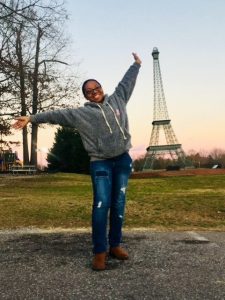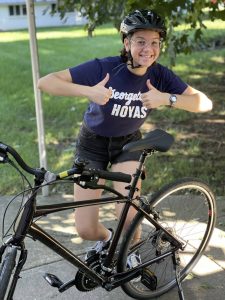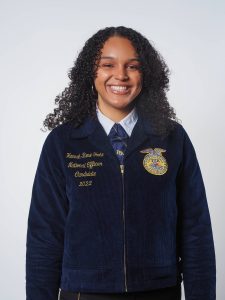The George Washington Carver Matching Assistantship for Graduate Studies seeks to attract and support under-represented scholars into MS and PhD degree programs in CAFNR and honors George Washington Carver, a native Missourian who gained international recognition in the early 20th century for his teaching and research in agriculture.
Carver was born in Diamond, Mo., in 1864. He researched crops such as peanuts, soybeans and sweet potatoes, which aided nutrition for farm families. He wanted poor farmers to grow these crops both as a source of their own food and as a source of other products to improve their quality of life.
Gabrielle Brewer

Gabrielle Brewer grew up in a small southeast Missouri town and chose to stay close to home attending Southeast Missouri State University for her undergraduate degree in environmental sciences and dietetics, but once in the workforce, working as a dietary manager at a nursing home in her hometown, her mentors pushed her to do more with her passions.
Today, she is pursuing a PhD in Nutrition and Exercise Physiology at Mizzou, and her motivation remains close to her home and her heart.
“My grandma was a teacher,” Brewer said. “I want to follow in her footsteps. I want to carry her torch.”
She realized she carried her grandmother’s love of teaching while mentoring underrepresented children in her hometown, and her goal is to become a professor once her education is complete.
Brewer’s research interests lies in the intersection between nutrition and mental health, and she hopes to incorporate this into her dissertation.
“I really enjoyed working within my community and helping them and talking about nutrition,” Brewer said. “It made me realize that if your belly isn’t full, your mental health is not right.”
Brewer first obtained her MS in clinical dietetics at Grand Valley State University in Grand Rapids, Mich., before starting her PhD program at Mizzou this past fall, and said she is confident she made the right choice in coming to Mizzou.
“I love the faculty, and I love the students here,” she said. “It’s a small cohort, and we are like a little community. They know the struggles, and I can always go to them.”
Melissa Jones

When Melissa Jones was attending high school in the small central Pennsylvania town of Newport, nestled in the foothills of the Appalachian Mountains, science was her least favorite subject. Today, she is pursuing an MS in Natural Resources — a scientific field.
So, what changed? During her undergraduate education at Georgetown University, Jones met her now advisor, Robin Rotman. Until that point, Jones only knew that she had a deep interest in social sciences and wanted to work directly with people.
“She changed the trajectory of what I wanted to do,” Jones said of Rotman. “She made me realize that you can integrate people into environmental work.”
Jones is now working alongside Rotman on a research project that examines resiliency among communities affected by chronic flooding. Jones believes the project will provide a fascinating look at human resiliency and the ways community cohesion help recover from natural disasters.
In the future, Jones hopes to put her knowledge to work in community outreach and involvement through park management or urban planning. She believes in the value of these human interactions that they can foster mutual education and provide a more impactful experience with the environment.
“Almost like a piece to the puzzle, I feel like I could be that link for people,” she said.
Being a George Washington Carver Fellow adds a layer of meaning to Jones’s time at Mizzou as she finds inspiration in the fellowship’s namesake.
“He gave back so much to his communities — poor, rural, black communities — and taught them valuable skills before going back to research,” Jones said of Carver. “I want to give back the way that he did.”
Hannah-Rose Foote

Hannah-Rose Foote is the newest member of this academic year’s George Washington Carver Fellows cohort as she came to Mizzou to begin work on a Master’s in Agricultural Leadership, Communications and Education in the Spring 2023 semester.
“Throughout my time here, I am hoping to become part of a larger professional network and gain teaching experience that I can apply in the future as an educator,” she said.
Foote comes to Mizzou from New York where she grew up in the upstate town of Richmondville and then obtained her undergraduate degree at the State University of New York (SUNY) at Cobleskill.
It was at SUNY Cobleskill that Foote first gained interest in a Master’s program at Mizzou. One of her professors, Ben Weikert, is an alumnus and encouraged Foote to consider CAFNR. Weikert completed his PhD in Agricultural Leadership, Communication and Education at CAFNR in 2017.
“He spoke very highly of the school,” she said. “I was also attracted to Mizzou because of their rolling admissions, campus activities and local areas.”
Foote considers it an honor to be a George Washington Carver Fellow.
“Mizzou is a predominantly white school, so it is wonderful that the Carver Fellowship exists to draw attention to the need for diversity in the ag sciences,” she said. “I am excited to be a part of a more colorful future.”